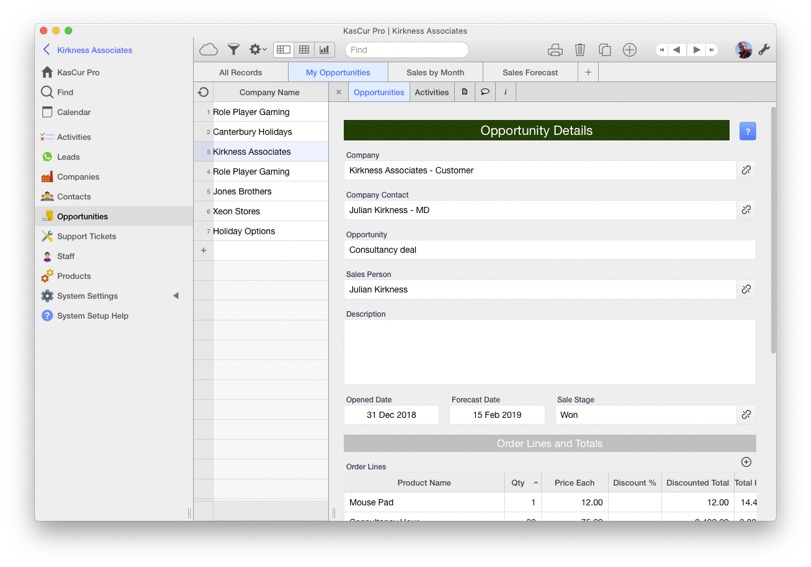Do you need a CRM if you have a Database?
04/03/20 16:33
This is a question I have asked myself for years - long before most CRMs and Databases were in the cloud. None of my businesses have ever used a separate CRM app - let's look at why.
What does a CRM do?
A Customer Relationship Management system is essentially there to manage and report upon your ongoing interactions with your clients. This means looking after all sales activities, support interactions (though this is sometimes separate), bulk emailing, etc. From this information we can produce sales forecasts, quotations (and perhaps invoices), analyses of your support performance etc.
At the core of all of this is a mechanism to remind staff of their outstanding tasks which may be based upon standardised processes or individually entered and you may even have facilities for customers to log into a 'portal' to interact with the system directly.
All of this is well within the capabilities of the databases I generally work with (Knack, Ninox, Tadabase and Airtable) and the amazing part is that mostly these tools can be licensed for less than the cost of a typical CRM (which can be very costly).
Advantages of Using a Database
In the course of my consultancy work with clients, where I have built many 'CRM' like systems, the one thing I've learnt is that no two companies actually want the same thing. For example I have a client where their customers approve and pay for their orders online directly within the system.
Databases generally give you the flexibility to build processes in addition to the core CRM features, whatever they may be.
Additionally, most database suppliers provide customers with template apps which can be a great starting point from which to build your own. In some cases this is taken further through a partner network where companies like us provide more sophisticated templates / apps which clients can use, usually at little cost. Indeed, if you've looked at the Ninox Apps page on this site you'll have seen that we provide KasCur Pro for Ninox which is a fairly comprehensive CRM app which can be downloaded and used entirely from of charge on that platform - you only need to pay a small fee (£125) if you want access to customise the app.

Conclusion
My own view is that a database like those mentioned provides a far better platform from which to begin automating your business than a CRM app - they're more flexible and often more cost effective.
Further Information
You can find out more about Knack here.
You can find out more about Ninox here.
You can find out more about Tadabase here.
You can find out more about Airtable here.
If you would like to find out more about KasCur Pro click here and if you already have Ninox, you can download a copy of KasPer Pro from Online Database Solutions, searching for KasCur Pro.
What does a CRM do?
A Customer Relationship Management system is essentially there to manage and report upon your ongoing interactions with your clients. This means looking after all sales activities, support interactions (though this is sometimes separate), bulk emailing, etc. From this information we can produce sales forecasts, quotations (and perhaps invoices), analyses of your support performance etc.
At the core of all of this is a mechanism to remind staff of their outstanding tasks which may be based upon standardised processes or individually entered and you may even have facilities for customers to log into a 'portal' to interact with the system directly.
All of this is well within the capabilities of the databases I generally work with (Knack, Ninox, Tadabase and Airtable) and the amazing part is that mostly these tools can be licensed for less than the cost of a typical CRM (which can be very costly).
Advantages of Using a Database
In the course of my consultancy work with clients, where I have built many 'CRM' like systems, the one thing I've learnt is that no two companies actually want the same thing. For example I have a client where their customers approve and pay for their orders online directly within the system.
Databases generally give you the flexibility to build processes in addition to the core CRM features, whatever they may be.
Additionally, most database suppliers provide customers with template apps which can be a great starting point from which to build your own. In some cases this is taken further through a partner network where companies like us provide more sophisticated templates / apps which clients can use, usually at little cost. Indeed, if you've looked at the Ninox Apps page on this site you'll have seen that we provide KasCur Pro for Ninox which is a fairly comprehensive CRM app which can be downloaded and used entirely from of charge on that platform - you only need to pay a small fee (£125) if you want access to customise the app.

Conclusion
My own view is that a database like those mentioned provides a far better platform from which to begin automating your business than a CRM app - they're more flexible and often more cost effective.
Further Information
You can find out more about Knack here.
You can find out more about Ninox here.
You can find out more about Tadabase here.
You can find out more about Airtable here.
If you would like to find out more about KasCur Pro click here and if you already have Ninox, you can download a copy of KasPer Pro from Online Database Solutions, searching for KasCur Pro.
blog comments powered by Disqus